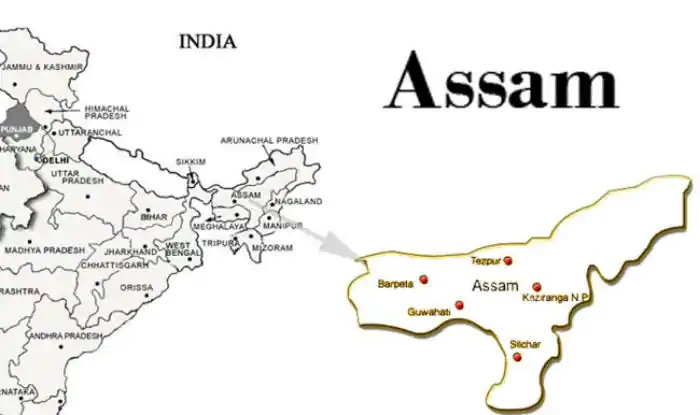AnalyticsBreaking News
Complexities of delimitation in Assam, writes Anand Debsharma

Sept.14: Delimitation and elections are the two pillars of parliamentary democracy. The periodical readjustment of the Lok Sabha and assembly constituency is mandatory in representative democracy system, where member constituencies are demarcated and determined for electing political representatives. Boundaries of electoral constituencies are drawn upon the basis of population. In India also, constituencies are delimitated on the basis of last published census figures relatively on equal population. Delimitation is a complex and cumbersome exercise requiring very careful and meticulous handling as it involves politically sensitive and socially volatile issues.
 In most of the countries, the task of delimitation of constituencies are entrusted with responsible body. There are four kinds of bodies that take up the exercise of delimiting parliamentary and assembly constituency. These are: i. Boundary or Delimitation commission, ii. Legislature, iii. Election Commission, iv Government Department.
In most of the countries, the task of delimitation of constituencies are entrusted with responsible body. There are four kinds of bodies that take up the exercise of delimiting parliamentary and assembly constituency. These are: i. Boundary or Delimitation commission, ii. Legislature, iii. Election Commission, iv Government Department.
In India, Australia, Botswana, the UK and Namibia, the work of delimitation is entrusted with a body known as boundary or delimitation commission. The task of delimiting the boundaries of constituency is dealt with by legislature in the USA, Canada, France, Italy, German, Belgium, Poland and Sweden. The delimitation work is done by election Commission itself in Pakistan, Turkey, Belarus, Lithuania and Ukraine. In countries such as Hungary the delimitations exercise is given to the government departments.
 Indian constitution has provided certain basic laws for the delimitation of the constituencies for Lok Sabha and Assembly constituencies. The other actual procedural frame works are left out with the indication that is to be decided by the parliament. The Articles 81, 82, 170, 327, 329, 330, 332 of constitution of India in one or other way are connected with the process of delimitation of constituencies and related subjects.
Indian constitution has provided certain basic laws for the delimitation of the constituencies for Lok Sabha and Assembly constituencies. The other actual procedural frame works are left out with the indication that is to be decided by the parliament. The Articles 81, 82, 170, 327, 329, 330, 332 of constitution of India in one or other way are connected with the process of delimitation of constituencies and related subjects.
81 – Composition of house of the people
82 – Readjustment after each census
170 – Composition of legislature Assembly
327 – Power of the Parliament to make provision with respect to
legislature (parliamentary and assembly).
328 – Power of legislation of a state to make provision with respect to
election to such state.
329 – Barred to interfere in by courts in electoral mater.
330 – Reservation of seats for SCs and STS in the house of the people.
332 – Reservation of seats for SCs and STS in the legislative Assembly of seats
 After independence, the first delimitation exercise in 1950-51 was carried out by the President with the help of the Election Commission, as the Constitution at that time was silent on who should undertake the division of states into Lok Sabha seats. This delimitation was temporary as the Constitution mandated redrawing of boundaries after every Census. Hence, another delimitation was due after the 1951 Census.
After independence, the first delimitation exercise in 1950-51 was carried out by the President with the help of the Election Commission, as the Constitution at that time was silent on who should undertake the division of states into Lok Sabha seats. This delimitation was temporary as the Constitution mandated redrawing of boundaries after every Census. Hence, another delimitation was due after the 1951 Census.
Pointing out that the first delimitation had left many political parties and individuals unhappy, the Election Commission advised the government that all future exercises should be carried out by an independent commission. This suggestion was accepted by the Government and the Delimitation Commission Act was enacted in 1952 viz. Delimitation Commission Act, 1952. Under Article 82 of the Constitution, the Parliament by law enacts a Delimitation Act after every census. After coming into force commencement of the Act, the Central Government constitutes a Delimitation Commission. This Delimitation Commission demarcates the boundaries of the Parliamentary Constituencies as per provisions of the Delimitation Act.
 Delimitation Commissions have been set up four times — 1952, 1963, 1973 and 2002 under the Acts of 1952, 1962, 1972 and 2002. The basis for the delimitation exercise in 1952 was the population figures from the 1951 Census. There was no delimitation after the 1981 and 1991 Censuses. The Constitution was amended during Indira Gandhi’s Emergency Rule in 1976 to suspend delimitation until 2001. The present delimitation of constituencies has been done on the basis of 2001 census figures under the provisions of Delimitation Act, 2002. Notwithstanding the above, the Constitution of India was specifically amended in 2002 not to have delimitation of constituencies till the first census after 2026. Thus, the present Constituencies carved out on the basis of 2001 census shall continue to be in operation till the first census after 2026. This was justified on the ground that a uniform population growth rate would be achieved throughout the country by 2026. So, the last delimitation exercise — started in July 2002 and completed on May 31, 2008 — was based on the 2001 Census and only readjusted boundaries of existing Lok Sabha and Assembly seats and reworked the number of reserved seats.
Delimitation Commissions have been set up four times — 1952, 1963, 1973 and 2002 under the Acts of 1952, 1962, 1972 and 2002. The basis for the delimitation exercise in 1952 was the population figures from the 1951 Census. There was no delimitation after the 1981 and 1991 Censuses. The Constitution was amended during Indira Gandhi’s Emergency Rule in 1976 to suspend delimitation until 2001. The present delimitation of constituencies has been done on the basis of 2001 census figures under the provisions of Delimitation Act, 2002. Notwithstanding the above, the Constitution of India was specifically amended in 2002 not to have delimitation of constituencies till the first census after 2026. Thus, the present Constituencies carved out on the basis of 2001 census shall continue to be in operation till the first census after 2026. This was justified on the ground that a uniform population growth rate would be achieved throughout the country by 2026. So, the last delimitation exercise — started in July 2002 and completed on May 31, 2008 — was based on the 2001 Census and only readjusted boundaries of existing Lok Sabha and Assembly seats and reworked the number of reserved seats.
 The Delimitation Act of 2002 was amended on January 14, 2008, to empower the President to postpone the exercise in four northeastern states viz. Assam, Arunachal Pradesh, Manipur or Nagaland by introducing Section 10A and Section 10B to the Delimitation Act. Subsequently, Parliament had decided that instead of creating another Delimitation Commission for the limited purpose of redrawing seat boundaries in the four northeastern states, the exercise there would be carried out by the Election Commission. As such, Representation of the People Act 1950 was amended and introduced Section 8A for this purpose on 16th April, 2008.
The Delimitation Act of 2002 was amended on January 14, 2008, to empower the President to postpone the exercise in four northeastern states viz. Assam, Arunachal Pradesh, Manipur or Nagaland by introducing Section 10A and Section 10B to the Delimitation Act. Subsequently, Parliament had decided that instead of creating another Delimitation Commission for the limited purpose of redrawing seat boundaries in the four northeastern states, the exercise there would be carried out by the Election Commission. As such, Representation of the People Act 1950 was amended and introduced Section 8A for this purpose on 16th April, 2008.
 After formation of the delimitation commission, P.I.L. No. 62 of 2007 was filed before the Hon’ble Gauhati High Court, which was referred to a larger bench of five judges of the Hon’ble High Court. Vide order dated 16.08.2007, the 5 judge bench of the Hon’ble High Court had noted the following concerns, with regard to delimitation in the State of Assam based on the 2001 Census:
After formation of the delimitation commission, P.I.L. No. 62 of 2007 was filed before the Hon’ble Gauhati High Court, which was referred to a larger bench of five judges of the Hon’ble High Court. Vide order dated 16.08.2007, the 5 judge bench of the Hon’ble High Court had noted the following concerns, with regard to delimitation in the State of Assam based on the 2001 Census:
“In so far as the State of Assam is concerned, the main grievance of the petitioners appears to be identification of what is contended, on a definite basis in view of the judgment of the Supreme Court in Sarbananda Sonowal’s case reported in (2005) 5 SCC 665, to be a large number of illegal migrants who have been covered by the Census Report of the year 2001. The aforesaid question is inextricably linked to the process of de-limitation of the territorial boundaries of the constituencies as a whole with ultimate result that such illegal migrants in the State may not be permitted to participate in the electoral process. The submission made by the learned counsels for the parties are capable of raising hypothetical question of exclusion of a large number of a segment of the population constituting the State Assembly from the electoral process. Permitting such illegal migrants to participate in the electoral process of the country would be contrary to the letter and spirit of the Constitution and the laws and, therefore, the exercise of de-limitation process which is carried on the basis of the data published by the Census Commission without first determining the citizenship in question would be inconsistent with the Constitutional rights of the citizens.”
 The delimitation work in respect of Assam was suspended first in pursuance of the stay order of the Gauhati High Court in the aforesaid case viz. Shri Ram Prasad Sarmah and others versus Union of India and Other (PIL 62 of 2007). Thereafter, the resumption of delimitation by the Delimitation Commission consequent to the Hon`ble Supreme Court’s stay on the Gauhati High Court’s Order. That once the Delimitation Commission had given its report, the process of delimitation for the State of Assam was deferred by the issuance of Notification No. S.O. 283(E) dated 08.02.2008 by the President under Section 10A of the Delimitation Act, 2002. The decision was taken, inter alia, in light of the aggravated law and order situation in Assam, non-availability of the NRC, Assam, etc.
The delimitation work in respect of Assam was suspended first in pursuance of the stay order of the Gauhati High Court in the aforesaid case viz. Shri Ram Prasad Sarmah and others versus Union of India and Other (PIL 62 of 2007). Thereafter, the resumption of delimitation by the Delimitation Commission consequent to the Hon`ble Supreme Court’s stay on the Gauhati High Court’s Order. That once the Delimitation Commission had given its report, the process of delimitation for the State of Assam was deferred by the issuance of Notification No. S.O. 283(E) dated 08.02.2008 by the President under Section 10A of the Delimitation Act, 2002. The decision was taken, inter alia, in light of the aggravated law and order situation in Assam, non-availability of the NRC, Assam, etc.
On 28th February, 2020, the Ministry of Law and Justice, issues an Order vide no. S.O. 903(E) and cleared the decks for the resumption of the delimitation exercise in the four states by cancelling the order of February 8, 2008. This Order also clearly said that- “there is a significant improvement in the security situation in the State of Assam. There is also reduction in insurgency incidents and improvement in law and order of these States making the situation conducive for carrying out the delimitation exercise which was deferred in the State in the year 2008. Therefore, it appears that the circumstances that led to the deferring of the delimitation exercise in the State of Assam have ceased to exist and that the delimitation of the constituencies as envisaged under the Delimitation Act, 2002 could be carried out now.”
Subsequently, on March 6, 2020, the Law Ministry under Government of India In exercise of the powers conferred by section 3 of the Delimitation Act, 2002 notified the Delimitation Commission for the four northeast states and Jammu and Kashmir, which was also left out in 2002-08. Former Supreme Court judge Justice Ranjana Prakash Desai is its chairperson, and Election Commissioner Sushil Chandra is the Election Commission’s representative on the panel. The said Delimitation Commission shall delimit the constituencies of the States of Assam, Arunachal Pradesh, Manipur and Nagaland in accordance with the provisions of the Delimitation Act, 2002.
On 16th day of March, 2020, two Assam residents namely BRELITHAMARAK and BHANU JAY RABHA have also filed a Writ petition vide W.P. (C) No. 454/2020 in the Supreme Court seeking a direction to the authorities to defer the delimitation process until the end of Census 2021. Thereafter AIUDF, Jamiat Ulama-i-Hind (M), KM Zakaria Barbhuiya, Sheikh Noorul Haque and two other were also filed Writ Petition respectively before the Hon`ble Supreme Court and all the cases are tagged with W.P.(C) No.454/2020. On 27th day of May, 2020, the Hon`ble Supreme Court has sought responses from the Centre and the Assam government on the aforesaid plea.
Very recently, former Legal Adviser of Election Commission of India namely SK Mendiratta also raised a question about legality of Notification No. S.O. 1015(E) dated- 6th March, 2020. Because, it violates the Representation of the People Act, 1950 as amended up-to-date. Mendiratta wrote a letter to the three election commissioners on June 4 pointing out the contradiction between the Law Ministry’s notification of March 6 and Section 8A of the RP Act 1950. According to Section 8A of the Representation of the People Act, 1950, If the President is satisfied that the situation and the conditions prevailing in the States of Arunachal Pradesh, Assam, Manipur and Nagaland are conducive for the conduct of delimitation exercise, he may, by order, rescind the deferment order issued under the provisions of section 10A of the Delimitation Act, 2002 in relation to that State, and provide for the conduct of delimitation exercise in the State by the Election Commission. So it is ample clear from the Section 8A that in such situation the exercise must be carried out by the Election Commission not by constituting the Delimitation Commission. It is precedence of the Election Commission being vested with the authority to redraw boundaries of constituencies –including when Delhi was delimited to 70 seats in 1991-92, and Uttarakhand to 70 seats in 2000.
Now, the Centre is preparing to move an amendment to the Representation of the People’s Act, 1950 in the ongoing monsoon session of the Parliament to ensure sound legal footing for delimitation of constituencies in above-mentioned four north eastern states. The proposed “The Representation of People (Amendment) Bill, 2020” seeks to amend section 8A of the Representation of the People Act, 1950, according to a Lok Sabha bulletin. It is also reported that by introducing a new amendment in Section 8A to remove contradiction between the Law Ministry’s notification of March 6 and Section 8A of the RP Act 1950.Thereafter, delimitation of constituencies in above-mentioned four north eastern states is carried out by an independent Delimitation Commission. The Constitution mandates that its orders are final and cannot be questioned before any court.





